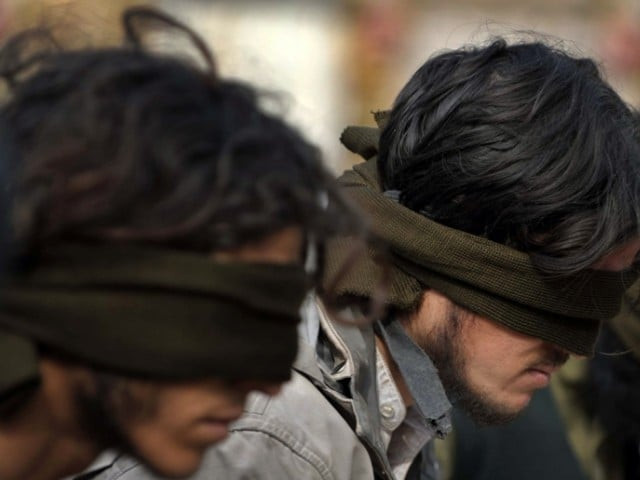SC upholds death penalty for 16 terrorists
Five-judge bench dismisses appeals against military court verdicts

PHOTO: REUTERS
The appellants had challenged the military courts’ judgments citing a lack of transparency and due process. The appellants included nine members of the outlawed Tehreek-e-Taliban Pakistan and two al Qaeda members. Two are said to have been involved in the methodical killing of nearly 150 pupils and staff at Peshawar’s Army Public School (APS) in December 2014.
Chief Justice Anwar Zaheer Jamali-led five-judge bench – which had reserved its judgment on June 20 – dismissed the appeals, saying the appellants had not proved that the military courts violated any constitutional rights or failed to follow procedure, in a blow to some campaigners who contend the military courts violate people’s rights.
The appeals had been filed by Bacha Laiq, Anwar Bibi, Aliur Rehman, Nek Maro, Said Zaman Khan, Sakhi Muhammad, Sher Alam, Mashooqa Bibi, Ajab Gul, Khan Afsar Khan, Javed Iqbal Ghauri, Mohibullah, Fazal Ghafar, Zarba Khelaw, Aqsan Mehboob and Hafiz Muhammad Sadiq on behalf of the convicts.
“All the titled civil petitions for leave to appeal are dismissed and leave declined,” reads the 183-page judgment authored by Justice Sheikh Azmat Saeed and read out by the chief justice. Each case has been separately discussed in the judgment.
The same judge had authored a verdict in favour of the 21st constitutional amendment under which the military courts were set up to try hardcore terrorists. Seven judges of the apex court had endorsed the judgment.
Monday’s judgment says it is a settled law that while exercising the power of judicial review in matters of this nature neither the high court nor the top court can sit in appeal over the conclusion drawn by the field general court martial (FGCM) or analyse the evidence produced before it. However, the court has examined the records of all cases.
“It appears from the records that the convicts, being subject to the Pakistan Army Act, were tried for the offences triable by the FGCM, which convened and constituted in accordance with the law.”
The bench observed that neither personal bias by any member of the FGCM against the convicts has been established nor the proceedings conducted were mala fide or conducted in bad faith for a collateral purpose.
“Likewise, it holds that it is not possible for us to conclude that these are the cases of no evidence or insufficient evidence nor is it possible to hold that the conclusions drawn by the FGCM are blatantly unreasonable or wholly improbable,” the judgment says, adding that the law and the rules, particularly those protecting the rights of the accused, were adhered to.
About the appellants’ claim that they had not been given access to the record of trials, the bench observed that no application in terms of Rule 130 of the Pakistan Army Act Rules, 1954, was ever made to the competent authority for the supply of copies of the proceedings of the FGCM at any point of time, not even when the matters were pending before the high court or before the Supreme Court.
It has also been noticed that the convicts did not object to their trial by the FGCM, as is evident from the records of the proceedings, the court observed. In the circumstances, the conviction and sentence awarded by the FGCM do not suffer from want of inherent jurisdiction.
The court said the counsel for the petitioners were unable to make out even the semblance of cases that the selection process in this behalf was tainted with mala fides of facts or law or even otherwise was without jurisdiction or coram non judice.
“The extraordinary circumstances necessitating the enactment of the 21st Constitutional Amendment Act and the Pakistan Army (Amendment) Act, 2015 are articulated in the Preambles thereof.”
With the dismissal of their appeals by the apex court, the convicts have exhausted the last option, Ashtar Ausaf Ali, the attorney general for Pakistan, told journalists after the bench handed down its verdict.
The 11 military courts have passed judgement on 128 people and found the defendants guilty in 104 cases, according to a tally by the International Commission of Jurists (ICJ).
Only four have avoided the death penalty and been sentenced to life in prison instead.
Rights activists have called for greater transparency, saying the courts fail to meet even the murky standards of military tribunals around the world.
Published in The Express Tribune, August 30th, 2016.


















COMMENTS
Comments are moderated and generally will be posted if they are on-topic and not abusive.
For more information, please see our Comments FAQ